News
The White House Ditched An Equal Pay Rule & Ivanka Trump Was Totally Fine With It

In 2016, President Barack Obama proposed a policy that would have required employers to report how much they pay their workers, alongside information about their employees' race, gender, and ethnicity. Under this policy, employers with 100 or more employees would have had to hand over this information to the Equal Employment Opportunity Commission (EEOC), in an effort to combat pay discrimination toward minority groups. However, the current administration has decided to get rid of the policy, and despite purportedly championing equal pay, Ivanka Trump is supporting this decision to overturn the anti-pay gap rule.
It is worth mentioning that Trump generally limits her discussion of the pay gap to the subject of gender — in other words, she only talks about what directly pertains to her. In her statement about the decision to scrap the Obama-era policy, Trump briefly mentioned gender while offering no new ideas about how to challenge pay discrimination across the board:
Ultimately, while I believe the intention was good and agree that pay transparency is important, the proposed policy would not yield the intended results. We look forward to continuing to work with EEOC, OMB, Congress and all relevant stakeholders on robust policies aimed at eliminating the gender wage gap.
The administration has attempted to justify this decision by arguing that the high amount of data provided by employers would not comply with the federal Paperwork Reduction Act. White House officials also expressed skepticism that they would find evidence of a pay gap in the data received.
However, Jenny Yang, chairwoman of the EEOC, has routinely defended the policy, saying that it would establish a foundation upon which the pay gap could be better understood and subsequently eliminated.
"We’d learn about a pay-discrimination problem because someone saw a piece of paper left on a copy machine or someone was complaining about their salary to co-workers,” Yang said in June. “Having pay data in summary form will also help us identify patterns that may warrant further investigation."
Trump's statement supporting the White House's decision is counter to her claims of championing women — particularly working women — and her purported interest in gender equality. During her father's campaign, Trump frequently talked about issues like gender wage gap and maternity leave; some saw it as an attempt to make his candidacy seem more palatable. However, these well-placed comments often did far more to boost her personal brand than they did to effect concrete political change.
Not many people are surprised by Trump's support. Though hailed as a "moderating force" on her father's worst impulses in the early months of the administration, Trump has displayed little to no influence on the policies her father has pushed through. And with her latest statement backing the rollback of this policy, it seems that even the personal brand she has built around working women is not enough motivation to take a stand for the issues she has long claimed to believe in.